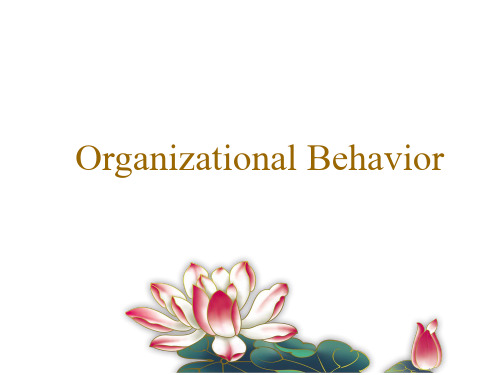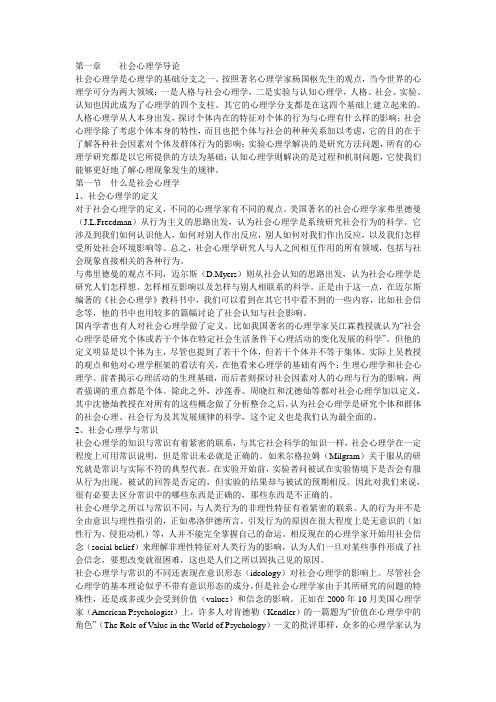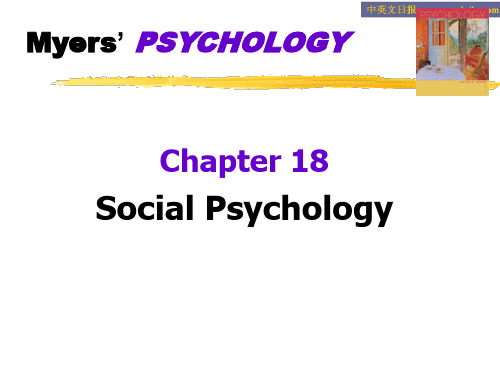Chapter 15 – Social Psychology
组织行为(英语)

Managers do their work in an organization, which is a consciously coordinated social unit, composed of two or more people ,that functions on a relatively continuous basis to achieve a common goal or set of goals.(组织是一种人们有目的地组合起来的社
(4) Management Skills Robert Katz has identified three essential management skills: technical , human, and conceptual.(罗伯特卡茨提出了三种基本 I. II. III. Technical Skills Human Skills Conceptual Skills
Gender Nearly half of the U.S. Workforce is now women, and women are a growing percentage of the workforce in most other counties throughout the world. Organizations need to ensure that hiring and employment policies create equal access and opportunities to individuals, regardless of gender. Race The percentage of Hispanics, blacks, and Asians in the U.S. workforce continues to increase. Organizations need to ensure that polices provide equal access and opportunities, regardless of race. National Origin A growing percentage of U.S. workers are immigrants or come from homes where English is not the primary language spoken. Because employers in the United States have the right to demand that English be spoken at the workplace on jobrelated activities, communication problems can occur when employees’ Englishlanguage skills are weak.
心理学专业英语

《心理学专业英语》教学大纲王国芳编写应用心理学专业课程教学大纲958 目录前言 (960)chapter 1 PERSPECTIVES IN PSYCHOLOGY (961)1.1 Approaches to psychology (961)1.2 Controversies in psychology (963)1.3 Ethical issues in psychology (964)Reviews and exercises(Answer the following questions in English): (964)Extension readings: (964)Chapter 2 RESEARCH METHODS (965)2. What do psychologists investigate? (965)Reviews and exercises(Answer the following questions in English): (967)Extension readings: (967)Chapter3 COGNITIVE PSYCHOLOGY (968)3.1 Perception (968)3.2 Attention (969)3.3 Memory (969)Reviews and exercises(Answer the following questions in English): (971)Extension readings: (971)Chapter 4 Developmental Psychology (972)4.1 Early socialization (972)4.2 Cognitive development (973)4.3 Later Socialisation (974)Reviews and exercises(Answer the following questions in English): (975)Extension readings: (975)Chapter5 Social Psychology (976)5.1 Social influence (976)5.2 Pro- and anti- social behaviour (977)5.3 Social relationships (978)Reviews and exercises(Answer the following questions in English): (979)Extension readings: (979)Chapter 6 Comparative Psychology (980)6.1 Reproductive Strategies (980)6.2 Kinship and social behaviour (981)6.3 Behaviour analysis (982)Reviews and exercises(Answer the following questions in English): (982)Extension readings: (983)Chapter7 Biopsychology (984)7.1 Cortical functions (984)7.2 Awareness (985)7.3 Motivation and emotion (986)Reviews and exercises(Answer the following questions in English): (987)心理学专业英语Extension readings: (987)Chapter8 Abnormal psychology (988)8.1 Conceptions of abnormality (988)8.2 Psychopathologies (989)8.3 Therapeutic approaches (990)Reviews and exercises(Answer the following questions in English): (991)Extension readings: (991)959应用心理学专业课程教学大纲960前言《心理学专业英语》是应用心理学专业的一门专业方向必修课,授课时间为一个学期 36 学时,修 2 学分。
《社会心理学》作者:戴维迈尔斯(全本)

第一章社会心理学导论社会心理学是心理学的基础分支之一。
按照著名心理学家杨国枢先生的观点,当今世界的心理学可分为两大领域:一是人格与社会心理学,二是实验与认知心理学,人格、社会、实验、认知也因此成为了心理学的四个支柱。
其它的心理学分支都是在这四个基础上建立起来的。
人格心理学从人本身出发,探讨个体内在的特征对个体的行为与心理有什么样的影响;社会心理学除了考虑个体本身的特性,而且也把个体与社会的种种关系加以考虑,它的目的在于了解各种社会因素对个体及群体行为的影响;实验心理学解决的是研究方法问题,所有的心理学研究都是以它所提供的方法为基础;认知心理学则解决的是过程和机制问题,它使我们能够更好地了解心理现象发生的规律。
第一节什么是社会心理学1、社会心理学的定义对于社会心理学的定义,不同的心理学家有不同的观点。
美国著名的社会心理学家弗里德曼(J.L.Freedman)从行为主义的思路出发,认为社会心理学是系统研究社会行为的科学。
它涉及到我们如何认识他人,如何对别人作出反应,别人如何对我们作出反应,以及我们怎样受所处社会环境影响等。
总之,社会心理学研究人与人之间相互作用的所有领域,包括与社会现象直接相关的各种行为。
与弗里德曼的观点不同,迈尔斯(D.Myers)则从社会认知的思路出发,认为社会心理学是研究人们怎样想、怎样相互影响以及怎样与别人相联系的科学。
正是由于这一点,在迈尔斯编著的《社会心理学》教科书中,我们可以看到在其它书中看不到的一些内容,比如社会信念等,他的书中也用较多的篇幅讨论了社会认知与社会影响。
国内学者也有人对社会心理学做了定义。
比如我国著名的心理学家吴江霖教授就认为“社会心理学是研究个体或若干个体在特定社会生活条件下心理活动的变化发展的科学”。
但他的定义明显是以个体为主,尽管也提到了若干个体,但若干个体并不等于集体。
实际上吴教授的观点和他对心理学框架的看法有关,在他看来心理学的基础有两个:生理心理学和社会心理学。
社会心理学英文版

Introduction to Social Psychology
What is Social Psychology?
• What is the difference between sociology and social psychology? • How do our Values enter into the study of Social Psychology? • What are the main areas of research today?
• Social psychology in three worlds
Copyright © 2003 by The McGraw-Hill Companies, Inc.
Is Social Psychology Just “Common Sense”?
• Hindsight bias
– The tendency to exaggerate, after learning an outcome, one’s ability to have foreseen it – the I-knew-it-all-along phenomenon
心理学Psycholog英文版(15人格)PPT课件

▪ person relaxes and says whatever comes to mind, no matter how trivial or embarrassing
The Psychoanalytic Perspective
▪ Oedipus Complex
▪ a boy’s sexual desires toward his mother and feelings of jealousy and hatred for the rival father
Personality Development
Freud’s Psychosexual Stages
Myers’ PSYCHOLOGY
Chapter 15
Personality
What is Personality?
▪ Personality
▪ an individual’s characteristic pattern of thinking, feeling, and acting
▪ basic perspectives
Personality Structure
▪ Ego
▪ the largely conscious, “executive” part of personality
▪ mediates among the demands of the id, superego, and reality
▪ operates on the reality principle, satisfying the id’s desires in ways that will realistically bring pleasure rather than pain
心理学Psycholog英文版(18社会心理学)PPT课件

Participant rubs face
Confederate rubs face
Participant shakes foot
Confederate shakes foot
Social Influence
▪ Asch’s conformity experiments
Social Influence
Social Thinking
▪ Fundamental Attribution Error
▪ tendency for observers, when analyzing another’s behavior, to underestimate the impact of the situation and to overestimate the impact of personal disposition
▪ tendency for people who have first agreed to a small request to comply later with a larger request
▪ Role
▪ set of expectations about a social position
Internal attitudes
External influences
Behavior
Social Thinking
▪ Attitudes follow behavior
▪ Cooperative actions feed mutual liking
Social Thinking
▪ Foot-in-the-Door Phenomenon
▪ example- when we become aware that our attitudes and our actions clash, we can reduce the resulting dissonance by changing our attitudes
01 Introduction to Psychology

Copyright © The McGraw-Hill Companies, Inc. Permission required for reproduction or display.
Chapter 1: Introduction to Psychology
The Subfields of Psychology
Understanding change and individual differences
– Developmental psychology
• Changes in behavior over the life span (womb to tomb)
The Subfields of Psychology
Physical and mental health
– Health psychology
• Explores relationship between psychological factors and physical ailments or disease
Copyright © The McGraw-Hill Companies, Inc. Permission required for reproduction or display.
Chapter 1: Introduction to Psychology
Module 1: Psychologist at Work
外显行为反应的一门学科
心理学是系统地研究心理过程和行为的科学
Copyright © The McGraw-Hill Companies, Inc. Permission required for reproduction or display.
SOCIAL PSYCHOLOGY OF INTERGROUP RELATIONS

CONTENTS
INDIVIDUAL PROCESSES IN INTERGROUP BEHAVIOR ................................ From Individual to Group Impressions ...................................................................... GROUP MEMBERSHIP ANDINTERGROUP BEHAVIOR .................................. The Scope and Range of Ethnocentrism .................................................................... TheDevelopment of Ethnocentrism .......................................................................... Intergroup Conflict and Competition ........................................................................ Interpersonal and intergroup behavior ........................................................................ Intergroup conflict and group cohesion ........................................................................ Power and status in intergroup behavior ...................................................................... Social Categorization and Intergroup Behavior ........................................................ Social categorization: cognitions, values, and groups ...................................................... Social categorization and intergroup discrimination ...................................................... Social identity and social comparison .......................................................................... THE REDUCTION OFINTERGROUP DISCRIMINATION ................................ " Intergroup Cooperation and Superordinate Goals Intergroup Contact. ..................................................................................................... Multigroup Membership and"lndividualizat~’on"of the Outgroup .......................... SUMMARY .................................................................................................................... 3 3 7 8 9 12 13 15 16 20 20 23 24 27 28 28 29 30
- 1、下载文档前请自行甄别文档内容的完整性,平台不提供额外的编辑、内容补充、找答案等附加服务。
- 2、"仅部分预览"的文档,不可在线预览部分如存在完整性等问题,可反馈申请退款(可完整预览的文档不适用该条件!)。
- 3、如文档侵犯您的权益,请联系客服反馈,我们会尽快为您处理(人工客服工作时间:9:00-18:30)。
Social Psychology
What if I told you that the guy who cut you off doing 90mph was racing to the hospital because his wife was in labor with their first child?? Did anyone even wonder if he might have had a good reason for going so fast? Is he still an &*(%#!?
Chapter 15 – Social Psychology
Stanley Milgram performed a series of studies on the Obedience to Authority to answer this exact question. Milgram's experiments on which his initial research was based were conducted at Yale from 1961-1962.
Chapter 15 – Social
Apply your learning. If your car breaks down, where do you think you would be more likely to get help? 1. on the LIE during rush - or 2. on route 12 in NY where you might not see another car for several hours at a time. The bystander effect illustrates why common sense and psychology do not often go hand in hand.
Chapter 15 – Social Psychology
The Milgram Studies: Obedience to Authority. During the Nuremberg trials after WWII, Herman Eichmann, a high ranking official of the Nazi Party, was on trial for war crimes and crimes against humanity. The questions is, "Could it be that Eichmann, was just following orders?" Are individuals responsible for their actions during a time of war if they were following orders? Thoughts??
Chapter 15 – Social Psychology
The Bystander Effect.
The Case of Kitty Genovese At approximately 3:20 on the morning of March 13, 1964, twentyeight-year-old Kitty Genovese was returning to her home in a nice middle-class area of Queens, NY, from her job as a bar manager. She parked her red Fiat in a nearby parking lot, turned-off the lights and started the walk to her second floor apartment on Austin St. some 35 yards away. She got as far as a streetlight when a man grabbed her. She screamed. Lights went on in the 10-floor apartment building nearby. She yelled, “Oh, my God, he stabbed me! Please help me!” Windows opened in the apartment building and a man’s voice shouted, “Let that girl alone.” The attacker looked up, shrugged and walked-off down the street. Ms Genovese struggled to get to her feet.
Chapter 15 – Social
How We Think About Others. Attributions: our explanations for “Why?” another person behaves or acts a certain way
Two types of attributions: 1. Internal: it was something about the person. Part of their personality, something within them. 2. External: it was something about the situation or context. Not due to the individual’s personality! Something outside the person.
Most of us automatically think like a personality psychologist and make internal attributions for other people’s behavior.
For example: If a brand new red Corvette cuts you off on the LIE and zips way ahead of you at about 90mph even though you are keeping up with traffic [in the middle lane], what do you automatically think about that person? Why did they do that? Would it make a difference if the car was a 1985 Chevy Chevette? [OK, think hypothetically here!]
Hale Waihona Puke ocialFundamental Attribution Error: the tendency to automatically make an internal attribution for another person’s behavior, and not adjust our thinking enough to account for external factors.
Chapter 15 – Social Psychology
Lights went back off in the apartments. The attacker came back and stabbed her again. She again cried out, “I’m dying! I’m dying!” And again the lights came on and windows opened in many of the nearby apartments. The assailant again left and got into his car and drove away. Ms Genovese staggered to her feet as a city bus drove by. It was now 3:35 a.m. The attacker returned once again. He found her in a doorway at the foot of the stairs and he stabbed her a third time--this time with a fatal consequence. It was 3:50 when the police received the first call. They responded quickly and within two minutes were at the scene. Ms Genovese was already dead. The only person to call, a neighbor of Ms Genovese, revealed that he had phoned only after much thought and an earlier phone call to a friend. He said, “I didn’t want to get involved.”
Chapter 15 – Social Psychology
38 people witnessed the attack against Kitty The attack lasted for almost 45 minutes Why didn’t anyone call the police or try to help her? The bystander effect: the more people that are present during an emergency or crisis situation, the less likely it is that someone will help due to diffusion of responsibility. Diffusion of responsibility: this phenomenon occurs when an individual knows that others are present in a crisis situation, and therefore they do not feel solely responsible for intervening. They make the assumption that someone else must be taking care of the crisis. In the case of Kitty Genovese witnesses reported thinking “surely someone must have done something by now”.
